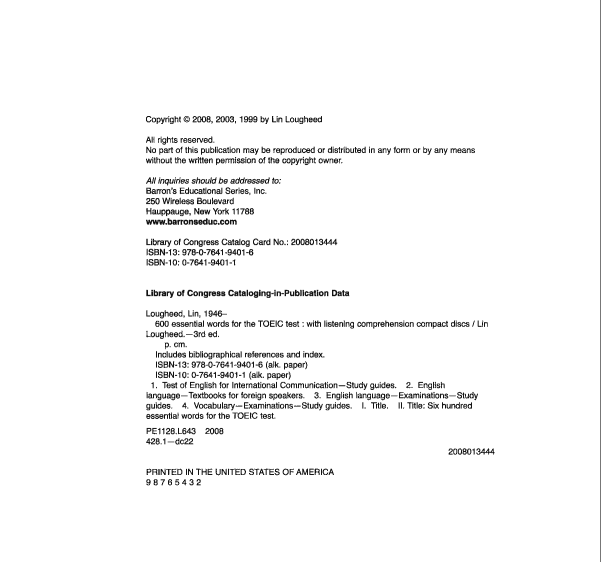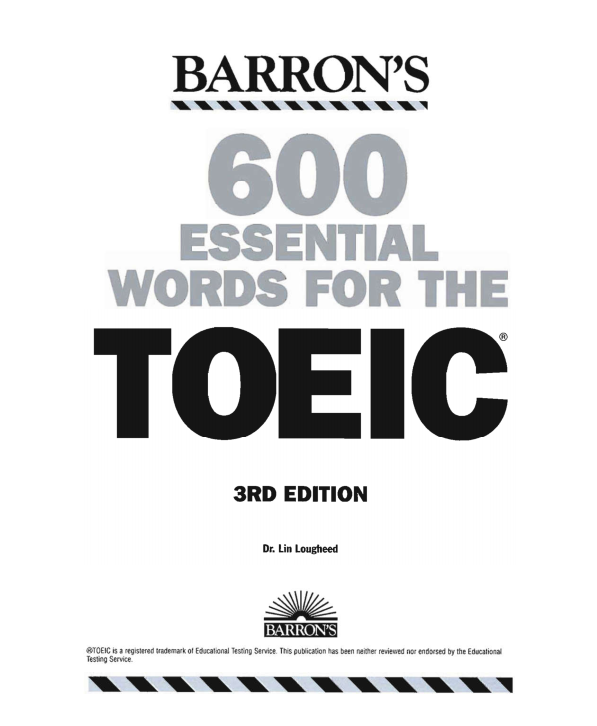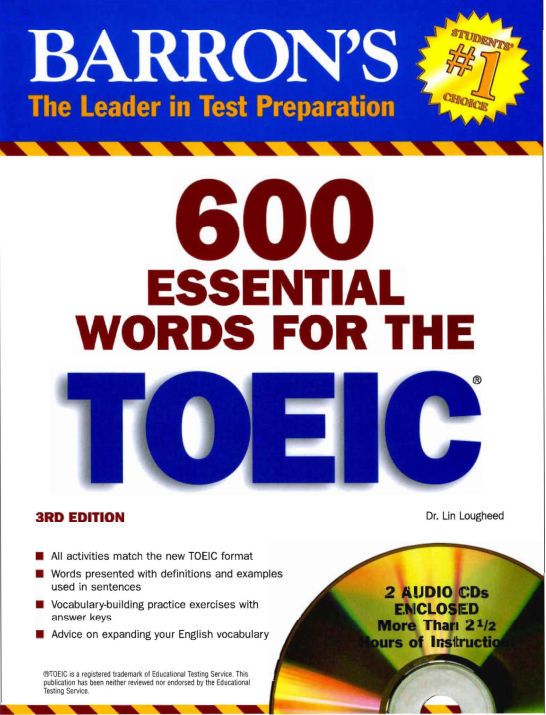Bên dưới đây mình có spoil trước 1 phần nội dung của cuốn sách với mục tiêu là để bạn tham khảo và tìm hiểu trước về nội dung của cuốn sách. Để xem được toàn bộ nội dung của cuốn sách này thì bạn hãy nhấn vào nút “Tải sách PDF ngay” ở bên trên để tải được cuốn sách bản full có tiếng Việt hoàn toàn MIỄN PHÍ nhé!



Table of Contents
Lessons 1-5
General Business
- Contracts
- Marketing
- Warranties
- Business Planning
- Conferences
Word Review #1
31
Lessons 6-10
Office Issues
6. Computers
7. Office Technology
8. Office Procedures
9. Electronics
10. Correspondence
Word Review #2
63
Lessons 11-15
Personnel
11. Job Advertising and Recruiting
12. Applying and Interviewing
13. Hiring and Training
14. Salaries and Benefits
15. Promotions, Pensions, and Awards
Word Review #3
95
Lessons 16-20
Purchasing
16. Shopping
17. Ordering Supplies
18. Shipping
19. Invoices
20. Inventory
Word Review #4
127
Lessons 21-25
Financing and Budgeting
21. Banking
22. Accounting
23. Investments
24. Taxes
25. Financial Statements
Word Review #5
159
Lessons 26-30
Management Issues
26. Property and Departments
27. Board Meetings and Committees
28. Quality Control
29. Product Development
30. Renting and Leasing
Word Review #6
191
Lessons 31-35
Restaurants and Events
31. Selecting a Restaurant
32. Eating Out
33. Ordering Lunch
34. Cooking as a Career
35. Events
Word Review #7
223
Lessons 36-40
Travel
36. General Travel
37. Airlines
38. Trains
39. Hotels
40. Car Rentals
Word Review #8
255
Lessons 41-45
Entertainment
41. Movies
42. Theater
43. Music
44. Museums
45. Media
257
263
269
273
281
Word Review #9
287
Lessons 46-50
Health
46. Doctor’s Office
47. Dentist’s Office
48. Health Insurance
49. Hospitals
50. Pharmacy
289
295
301
307
313
Word Review #10
319
Answer Key
Word Index
Appendix: Tapescript for the Listening Comprehension Exercises
321
325
329
What the Book Is About
This book teaches you vocabulary that will help you when you take the TOEIC (Test of English for International Communication). The TOEIC measures the English proficiency of people working in international business or planning to use English to communicate with others. Although the exam does not specifically test specialized vocabulary, the items on the exam are in specialized contexts.
This book will help you understand specialized contexts that are often used on the TOEIC. The contexts are specialized, but the words are not. The words are general vocabulary. They can be used in many contexts. You will learn these words in contexts that are used on the TOEIC.
How to Use This Book
This book contains 50 lessons, and each lesson introduces you to 12 new words in a specific context. If you study one lesson every day, in 50 days you can learn 600 new words. You will practice these words by doing exercises that look just like the questions on the TOEIC.
Word List
On the first page of each lesson, you will see a list of 12 words. For each word you will see the definition of the word and two sentences using the word in context.
This page
• Introduces you to the words for the lesson
• Shows you the words in context
• Serves as a reference anytime you need to check the meaning of a word
Vocabulary in Context
Next you will see a paragraph called Vocabulary in Context. You will have the opportunity to see and use the words for the lesson in context.
• Complete the paragraph using words from the word list.
• Read the paragraph over to see all the words for that lesson used in context.
• Return to the paragraph as often as you like to reinforce the meanings of the words.
Word Families
On this page, you will see the verb, noun, adjective, and adverb forms of six words selected from the word list.
Example
Verb | noun | adjective
—|—|—
popularize | popularity | popular
You will also see sentences using these words in context.
On this page, you will
• Learn more words
• Learn to recognize words in their different forms
• Learn about word endings that change words into nouns, verbs, adjectives, and adverbs
Listening Comprehension
In this section, you will practice the words for the lesson by doing exercises that are just like the listening questions on the TOEIC.
Part 1—You will see a photo. You will choose the statement that best describes the photo.
Part 2—You will listen to a question or statement and choose the best response.
Part 3—You will listen to a conversation and answer three questions about it.
Part 4—You will listen to a talk and answer three questions about it.
You will practice the words for the lesson in context because the questions, conversation, and talk all use words from the word list for each lesson. You will also practice listening skills and test-taking skills that you will need when you take the TOEIC.
Reading Comprehension
In this section, you will practice the words for the lesson by doing exercises that are just like the reading questions on the TOEIC.
Part 5—You will choose the best word to complete each sentence.
Part 6—You will read a paragraph and choose words to complete it.
Part 7—You will read a passage, or two related passages, and answer comprehension questions.
You will practice the words for the lesson in context because the reading passages all use words from the word list for each lesson. You will also practice reading skills and test-taking skills that you will need when you take the TOEIC.
Strategies to Improve Your Vocabulary
One of the best ways to improve your vocabulary is to read, and read often. When you read, you
• See words in context
• Expose yourself to new words
The more you read, the more words you see. The more words you see, the more you will learn. Reading can be a very enjoyable experience, so make sure you read things that are interesting to you. Then you will have fun, improve your vocabulary, and build skills you will need for the TOEIC, all at once. When you read, there are several strategies you can use to improve your vocabulary.
- Analyze Word Parts
Words can be made of roots, prefixes (before the root), and suffixes (after the root).
Example
re (prefix) + circa (root) + tion (suffix) = recirculation
In English, many of these roots, prefixes, and suffixes come from Greek and Latin words. Learning the meanings of different roots, prefixes, and suffixes will help you increase your vocabulary.
Example
re- | bring together again | memorize
-uns | easy | -ıza
-ed | mountainous | -ate
-ment | capable | -en
-ship | musical
-er | athletic
-or | beautiful
-ee | careless
-ly | quickly
In this book, you will see many examples of words with these suffixes. - Recognize Grammatical Forms
Some suffixes tell you whether a word is a noun, an adjective, or an adverb. You can learn to recognize these different suffixes. They will help you understand the meanings of new words.
Examples
Nouns | Adjectives | Verbs | Adverbs
—|—|—|—
competition | easy | memorize |
deliverance | mountainous | refrigerate |
independence | capable | lengthen |
government | musical | |
friendship | athletic | |
community | beautiful | |
teacher | careless | |
attendee | | | quickly
In this book, you will see many examples of words with these suffixes. - Recognize Word Families
Just like brothers and sisters in the same family, words can be related, too. One word can become a noun, a verb, an adjective, or an adverb by changing its suffix.
Example
depend (verb)
dependance (noun)
dependable (adjective)
dependably (adverb)
These four words make up a word family. The meaning of each word is similar to the others, but each one has a different grammatical form. How can knowing about word families help you?
• You will learn more words. When you find a new word, look in the dictionary to find other members of the same word family.
• You will understand new words. Look carefully at a new word. It might be related to a word you already know.
• You will see many examples of word families in this book. - Make Your Own Word Journal
When you read, you will come across many new words, and you will need an organized way to record them.
• Use a special notebook just for recording your new words.
• Make a new page each day or each time you read a new article or story.
• For each new word write the word, a synonym, the definition, the original sentence where you found the word, and then make up your own sentence using the word.
• Every day, review the pages from the previous days.
• Photocopy the chart below to make the pages for your word journal.
Example
New Word | Meaning | Definition | Original Sentence | My Sentence
—|—|—|—|—
consider | think about | To think carefully about something | After considering all the difficulties, they decided to go ahead with the project. | I considered different schools before I chose this one.
Strategies to Practice Your Vocabulary
The more you use your new vocabulary words, the better you will remember them. There are a number of things you can do to practice and review new vocabulary words.
1. Review Every Day
Every time you sit down to work with this book, you should look over the words from the previous lesson. Do the same every time you work with your Word Journal or Daily Reading Log.
- Review words from previous lessons
- Note words that you are unsure of
- Include these words in the following suggested practice activities
2. Read Out Loud
Saying your vocabulary words out loud is another way to reinforce them. You can read word lists out loud, and you can also read the passages that contain your vocabulary words. You can read out loud
- The word lists from each lesson in this book
- The Vocabulary in Context paragraphs in this book
- The passages you read for your Daily Reading Log
- The word lists in your Word Journal
3. Categorize Words
Make a list of words that you want to review. Be sure to include the words that have given you difficulty. Divide the words into categories. For example


